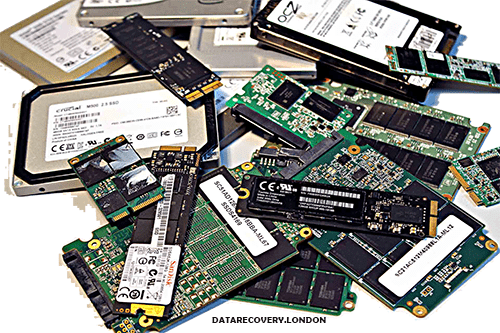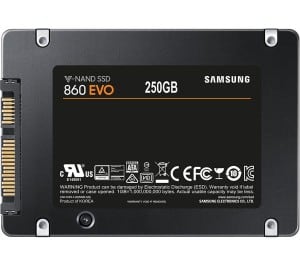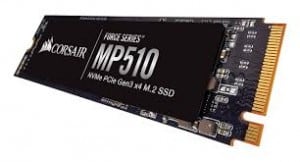 SSD Data Recovery and How We can Help You
SSD Data Recovery and How We can Help You
What is an SSD?
SSD stands for Solid State Drive. SSDs are essentially are disks which store computer data. Traditional disks are generally made up of mechanical parts and electronic components which spin while reading and writing computer data. That is why they make a whirring noise when reading and writing data. On the contrary, SSDs do not have any mechanical bits and they are all made of electronic circuits. This means they can come in all sorts of shapes and types. Some SSDs look like traditional hard drives while others look like computer memory modules.
How do SSDs work and how different are they from traditional disks?
SSDs (Solid State Drives) are made of a controller chip or CPU which manages the flow of data in and out of the data storage memory modules soldered onto the the SSD electronic circuit. The controller chip on board also manages the power to the data storage chips. Depending on the data capacity of the SSDs, there may be 2 or more data chips. As SSDs do not have any mechanical parts, they do not make any noise and do not fail if you drop them.
SSD data recovery can be challenging due to their complex nature in data storage and preservation. The good thing about them is that they are fast, very responsive in read/write operations and they are also shock-resistant therefore, do not get damaged when dropped as opposed to traditional mechanical drives which are slower and prone to failure if you drop or shock them. However there are downsides to SSDs as they are not perfect. First of all, data storage in SSD is fundamentally different from mechanical drives. To have a larger size, the manufacturers have to design circuits to accommodate more chips on board and then they have to write software on how to manage data across multiple data chips. This means they have to create actual RAID arrays of individual chips. Therefore, formatting an SSD can be problematic in data recovery as SSDs do not behave in the same way as the traditional disks do. In addition to this, SSDs are purely made of electronic circuits and software managing the circuit. Therefore, if any individual data chip in the array fails or the software in the data controller chip gets corrupted, the entire data volume will be brought down leading to data loss. This makes the reconstruction of the data volume and the file system very challenging and difficult. Another issue is wear and tear and degradation of the chips after 3-5 years depending on the quality of the silicon used in manufacturing the the SSD as opposed to good quality electro-mechanical disks which have a longer shelf-life as long as they are not subjected to shock or drop.
 How does SSD data recovery process work?
How does SSD data recovery process work?
As most computers and digital devices use SSDs for data storage, their usage is already overtaking the use traditional of electro-mechanical disks. Because of the prevalence of SSD in laptops, desktops and servers and others devices, you may experience data loss as a result of SSD failure. Therefore, SSD recovery is required so that you can regain access to your data. As SSDs store data differently compared to electro-mechanical disks, SSD data recovery is also conducted differently. Initially, the SSD data recovery specialist will attempt to repair the electronic circuit of the SSD. If this does not lead to a successful SSD recovery, then off-the-chip SSD recovery becomes essential. In this method, all the data memory chips are extracted from the circuit and labelled. Then the contents of each chip is dumped onto an SSD recovery workstation using a special device called a “chip reader”. When all the contents of all the data chips have been uploaded onto the workstation via the chip reader, all the data dumps are organised like a jigsaw so that a full image of the SSD data volume is obtained. This is done by using specialist SSD recovery tools not generally available to the general public. If the SSD is secured by encryption, the data volume must be decrypted by using the user password. Once the data volume is reconstructed from the data dumps and deciphered, SSD recovery technicians transfer the data onto a healthy external disk and prepare it for delivery or collection by the customer.
 “I have an SSD drive from a Mac, can you recover data from it?”
“I have an SSD drive from a Mac, can you recover data from it?”
Yes we can. Data Recovery Lab technicians are trained to recover data from all types of SSD including the ones from Apple Computers like iMacs, MacBook Pros and MAcBook Airs as well as Windows laptops, desktops and gaming computers. We have performed successful SSD data recovery on numerous disks since they appeared. SSD data recovery despite its complexity, is assured and we will be able to recover data from 9 out of 10 faulty SSDs. We have a well-equipped SSD Data recovery Lab in Finchley in London. All you need to do, is bring your SSD to us for data recovery.
“What if my SSD is not electronically sound but I have lost data because I deleted the files or format the SSD by accident?”
Yes we can! We will still be able to recover data from an SSD whose data has been deleted or the data volume has been accidentally formatted. Important note! Do NOT do any DIY data recovery or write any data onto the SSD disk otherwise you will overwrite the space used by the deleted data and SSD data recovery may not be successful.
Some of the most important causes of failure in SSD drives can be summarised as follows:
- Controller chip damage/failure
- Corrupted or damaged firmware
- NAND chip degradation
- Damage as result of power failure or surge
- Printed circuit board (PCB) failure
- SSD water/liquid damage
- Corruption of the flash chips
- Accidental deletion or formatting of data
- Damaged data connectors
- Faulty or dead capacitors
- Electronic component failure
- Flash cell degradation
- Corruption of the software in the controller chip
If you have lost data from an SSD for whatever reason, Data Recovery Lab can help you. All you need to do, is bring your SSD to us without further ado and we will certainly and happily be able to help you. We will ensure the end result is successful and will make you smile when you see your data again!. Call 0207 164 69 15 to book an appointment or for any help on SSD data recovery.


